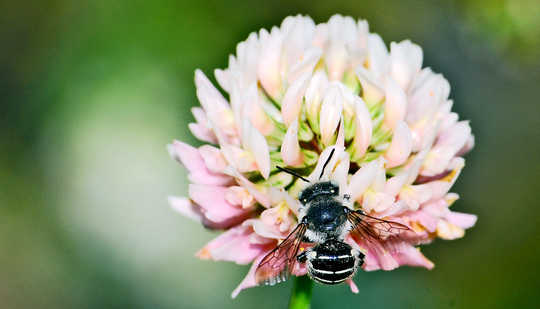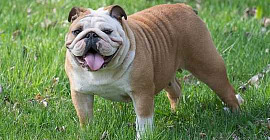 (Credit: Brad Smith/Flickr)
(Credit: Brad Smith/Flickr)
You might feel bad about having a less-than-manicured lawn, but it’s great for bees and other pollinators.
Beyond supporting healthy ecosystems for other species (including us), pollinators are key to bringing food to our tables, not to mention coffee, chocolate, and tequila.
Cutting yourself some slack in the yard can provide pollinators with food, shelter, and protection from pesticides, three things they need to survive. You probably shouldn’t let it all go and risk one of those sanctimonious letters from your homeowner’s association, but a lighter touch can make life easier for native pollinators—and you. Here’s how:
1. Learn to love clover and dandelions
Flowering weeds are an important food source for native bees, so you can feel good about leaving them in your lawn, says Rachel Mallinger, an assistant professor of pollinator ecology and conservation with the University of Florida’s Institute of Food and Agricultural Sciences.
Get The Latest By Email
“Providing floral resources is probably the number one thing that people can do, whether that’s just providing a few plants on your balcony, having a whole pollinator garden, or just letting flowering weeds be.”
2. Bare or sandy patches have a function
Unlike honey bees, many species of native bees don’t live in hives or colonies but by themselves in small holes the ground. When you’ve got a thin spot in your lawn or part of your garden that’s not covered in thick mulch or weed barrier, you’re providing habitat to native bees.
And you don’t have to worry about having wild bees in your yard, as they don’t defend their nests the way social bees and wasps sometimes do, says Jamie Ellis, professor of honey bee husbandry, ecology, and conservation.
“In general, it’s the social bees and wasps that are the stinging problems, not the solitary ones,” Ellis says. “Solitary bees are quite gentle.”
3. That old stump is also useful
It’s also a great habitat for solitary native bees, Mallinger says.
4. Let the bugs be
Going easy on insecticides around your home and yard can reduce unintended harm to beneficial species like bees, Mallinger says. And when you use pesticides, choose options that are least toxic to pollinators and follow the instructions on the label, Ellis suggests. For more information, visit the Honey Bee Research & Extension Lab’s website.
5. Bees love lazy mowers
Mowing less often can make your yard more pollinator-friendly. “Our landscapes don’t all have to be really short green grass,” Mallinger says. “We can have yards and habitats that look more wild, but that means changing people’s way of viewing habitats and not seeing that as messy or weedy, but seeing that as actually beneficial.”
If the neighbors complain when you skip a week of mowing, you can say you’re doing it for the bees.
Don’t have a yard? Hear Mallinger’s tips for helping bees and pollinators through food choices and more here:
Source: University of Florida
books_gardening









